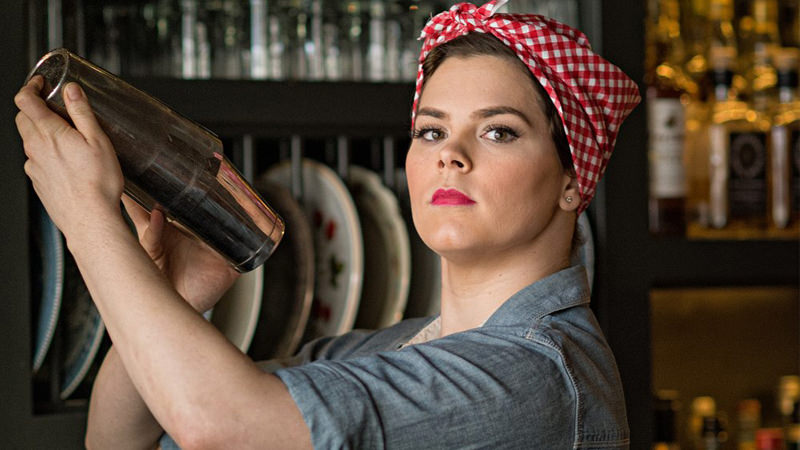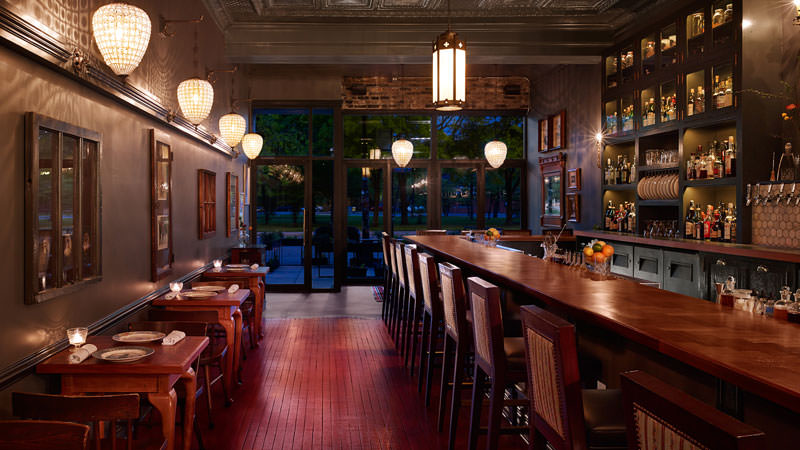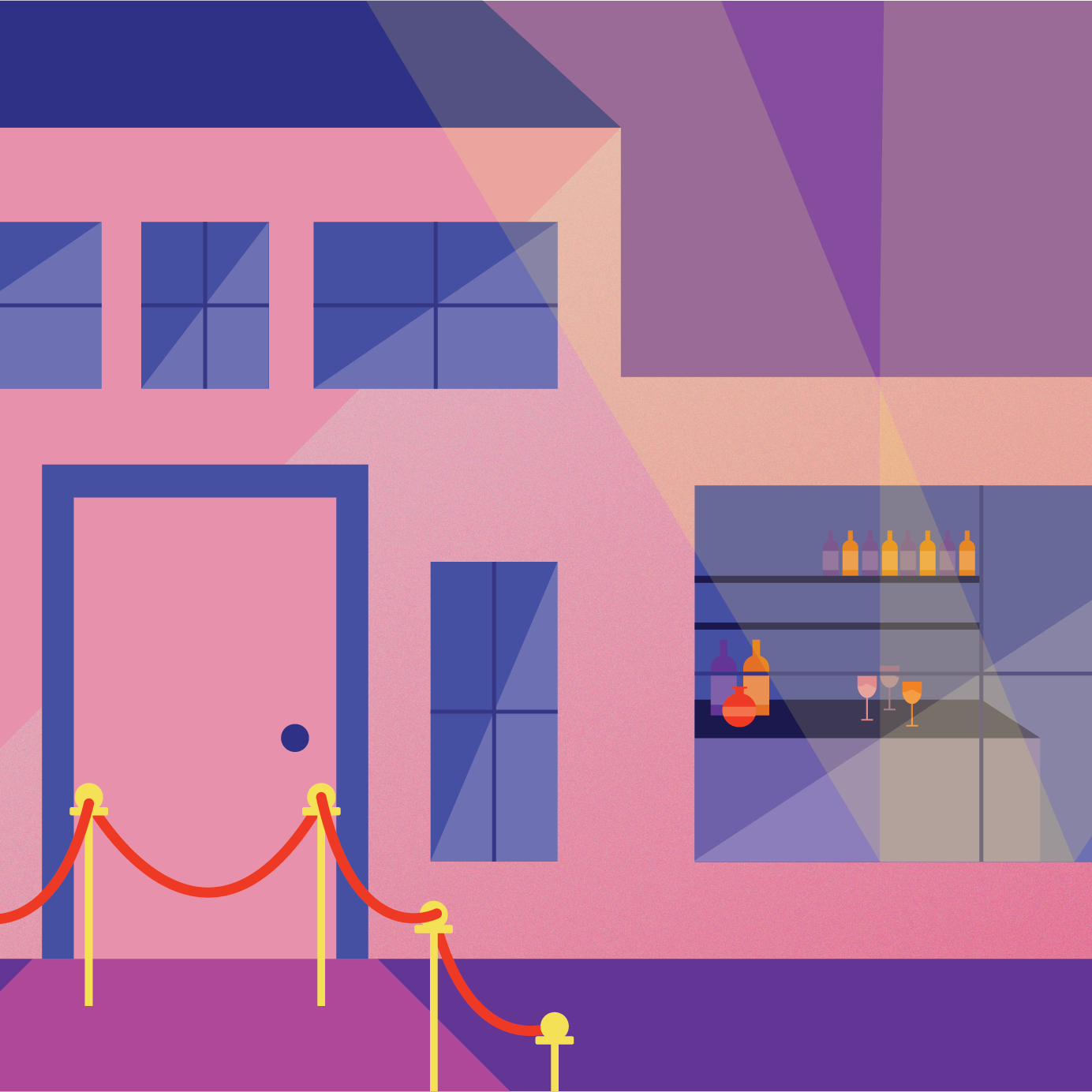The billionaire art collector was a regular at Billy Sunday, a hip amaro-based cocktail bar in Chicago’s Logan Square neighborhood. He was dazzled every time he drank its intriguing cocktails, many made with vintage ingredients and obscure amari.
Hmmm, he thought, wouldn’t it be swell to have this great of a cocktail bar right there in his new condo he was building downtown?
“He asked us if we could build him something similar to Billy Sunday,” explains Stephanie Andrews, head bartender. “Curate all the bottles, tools, glassware, so that he could start entertaining, hosting parties or work events, from his own home.”
For every drinker who has dreamed about having a great bar in their house, this is an inspired request. The idea of having a wide range of bottles, all types of cool coupes and jiggers, the ability to make an array of “professional” drinks just a few feet from your sofa is, well, intoxicating.
But how the hell do you even start? What would you even need? Where would you put it all?
Enter Billy Sunday. The amaro destination has quietly launched a professional-grade “home bar” service for those with the thirst, imagination, and budgets to drink their dreams. For a decent fee, starting at $1,000 and going all the way up to $100,000-plus, the bar staff will come to your house or apartment and discuss what exactly you want out of your dream home bar. Afterward, they’ll put together a professional-grade, bespoke bar, complete with bottles, tools, glassware, and all. So far, three customers in the Chicago area have purchased the service, though, theoretically, Billy Sunday is willing to work with anyone the world over.
“It was something we kept talking about because guests were always inquiring about the different bottles we use, or the different tools and where they came from,” Andrews says. “I have a home bar myself and I love to entertain, so we decided to finally start offering the same services to guests.”
You would think commercial cocktail bars wouldn’t want to encourage people to drink at home. But Billy Sunday’s mission has always been helping drinkers overcome the intimidation factor that comes with seeing all those different spirits behind the bar, the oddball tools you seemingly need just to execute a simple drink.

Andrews frequently runs classes at the bar. In “Cocktail 101” she goes over five basic cocktails, teaching students about, say, the Negroni. She’ll give a history, then show how to build a standard one, and finally how to put a Billy Sunday-esque twist on each drink.
“I noticed that’s when people start asking me, ‘Where can I get that [amaro]?’” Andrews says. “They’re sitting in the class and they realize they’ll want to eventually make this at home.”
So Andrews and the team at Billy Sunday decided to launch this as an à la carte service. Of course, having a “billionaire art collector” (who declined to talk to us for this story) as your first-ever home- bar customer is a pretty good way to launch any side business, especially because he wanted everything possible for his home bar, Andrews says. Rare Scotches. Vintage amari. Countless mixers and soda water. Unique tools and glassware that perfectly matched his space. Billy Sunday went so far as to advise what color to paint the bar walls and where to put the ice machine.
In a way, it was more similar to how “real” bars like Billy Sunday or the Folkart Management’s newest bar, Mordecai, are put together. Those can easily reach high six or seven figures in costs once fully designed, constructed, and stocked with ice machines, freezers, sinks, refrigerators, glassware, and other equipment.
Andrews acknowledges that this was not the typical home bar, though. “No one needs that crazy, extensive collection we put together for him,” she is quick to note.
In fact, less financially exuberant home bar aspirers need not worry if they only have a small nook in a tiny studio to turn into their home bar. “It’s all about what kind of space you have available and what you’re looking to accomplish,” she says.
Bars in Chicago can’t sell spirits directly to customers, so Billy Sunday taps Sole Agent for that. The “purveyor of vintage spirits” is owned by Alex Bachman, a former Billy Sunday bartender.
For bar tools and glassware purchases, the bar often utilizes Cocktail Kingdom, which has, Andrews notes, “done a great job of taking basic stainless steel and making it gorgeous.” For people who want more unique, one-of-a-kind glassware, that might mean the Billy Sunday team hitting up estate sales or searching on, believe it or not, Etsy.
You might be thinking, why is this necessary? What happened to a fridge full of beer and a couple of bottles in the wine rack? Isn’t that enough?
“People are much more savvy and knowledgeable than when I started in the restaurant business,” explains Matthias Merges, Folkart’s founder. “People are starting to place value on well-crafted and unique experiences, not only when they go out but also in outfitting their home.”

Is this merely the next step in the modern cocktail revolution?
“Setting up a home bar is as easy as dropping an old table across two sawhorses and filling a bucket with ice,” Michael Neff, co-owner of Houston’s The Cottonmouth Club, says. “That said, if you want something more aesthetically pleasing and functional, the sky’s the limit as to how much you can spend to make your home bar a mixology haven.”
More so than that, I think this might very well just be the ultimate in what we could call inconspicuous consumption. If, in post-World War II America, everyone wanted to be seen at the world’s most exclusive bars and restaurants, the ultimate sign of success today might just be turning your home into its own super-exclusive hangout.
“When the food revolution took hold, people that had means built custom kitchens. Indoor grills and chef quality tools became standard. Home bars are what’s next,” says Eric “E.T.” Tecosky, founder of Dirty Sue Premium Olive Juice, who has likewise found success among these domestic bar enthusiasts. “As the world’s thirst for all things cocktail continues to grow, so has the desire to step up your game at home.”
Once you’re ready to tap Billy Sunday and change your life for the better, the process is straightforward, albeit in the most wildly exciting way. You’ll start with a consultation with Andrews and her team. They will put together a basic “101” plan from which you can build more elaborately. “At Billy Sunday we create an outline, but it’s your story to tell,” Andrews says.
A month or so later, you’ll have your home bar and will be ready to start living like a billionaire art collector. Now you just need to learn how to make drinks!
Andrews, for her part, doesn’t think that’ll be a problem for most folks who purchase their dream home bar.
“People are very comfortable with what they typically drink, what they typically order,” she says. “The second they step out of their comfort zone and start making their own drinks, it’ll totally open the floodgates and they’ll be hooked.”
Billy Sunday’s Tips for Setting Up a Home Bar
- Aim for a variety of bottles — don’t just buy one style of spirit. Start building your collection with a least one agave product (like tequila or mezcal), whiskey, rum, and a few modifiers (chartreuse, Campari, etc.). You want all the essentials for great drinks.
- Invest in basic tools to execute the cocktails. A jigger, barspoon, shaker, strainer, and mixing glass at the least.
- Take the time to buy appropriate glassware — no plastic cups! Instead, look to the 1950s for inspirations, such as beautiful, etched coupes.
- As you establish your home bar, start with basic cocktails and keep building from there.
- Embrace that making drinks is an ongoing process without a finish line.
